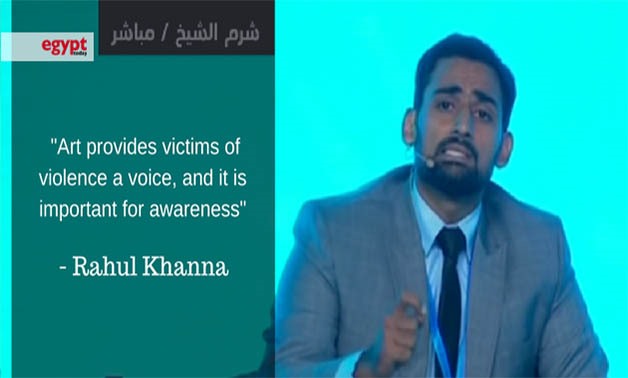
Indian actor Rahul Khanna at the panel of the “Challenges and Issues Facing World Youth” session on third day of the World Youth Forum (WYF) – Press Photo
CAIRO – 7 November 2017: “Some media fall in the trap of giving more attention to getting a scoop at the expense of fact-checking which can cause harm to individuals, and negatively influence countries’ economies,” mass communications professor Dina Mahmoud Hamed said during a World Youth Forum (WYF) session on Tuesday.
The third day of the forum kicked off with a session titled “Challenges and Issues Facing World Youth” in Sharm El-Sheikh where the president highlighted the issues and challenges facing the country and remarkably impacting Egyptian youth.
Hamed said that some states exert effort to promote media literacy among children and youth. She added that there has been a tendency, even among international media, to manipulate public opinion rather than produce fair and balanced objective stories. “There is a difference between censorship and regulation,” she said.
On the other hand, Indian actor Rahul Khanna shared his experience in trying to promote awareness among the illiterate, embedding certain values in their minds through plays in local theatres. He mainly aims to counter ideas of rape and sexual harassment in India.
Khanna highlighted the case of a girl called Shatha, who was harassed, gang-raped, and injured in New Delhi saying; “Assailants never received education; they never took their hats off for a lady.”
“We have theatres that can help change the mentalities of many under the poverty line,” the actor added saying that his niece was raped in a hospital when she was five.
Business administration professor Gamal El Sayed Ratba displayed four pillars that must exist to eliminate unemployment – which is at 12.7 percent currently – stating that 75 millions of the world youth suffer from unemployment. The first pillar is promoting entrepreneurship culture. That is in addition to creating a database of current and prospective job openings, and designing curricula that fulfill market needs and development goals.
The second is the expansion in infrastructure projects building big urban agglomerations. The third is improving technical education, and building establishments that provide that type of education in new urban agglomerations. The fourth is that the state must launch programs to develop human and natural resources instead of counting on foreign entities to do so.
Egypt’s first international youth event is set to run until November 10, bringing together 3,000 youth represented by 60 delegations from around the world.
The seven-day gathering witnesses the participation of official youth representatives over 18 years old, leaders of various youth networks, heads of state, media figures and around 250 young Egyptian expats. It is held under the theme "We Need to Talk."
The WYF sends a message of peace, prosperity, harmony and love to the entire world. It is considered a strong opportunity for youth globally to communicate with each other.
The idea of holding an international youth conference in Egypt was made during the third National Youth Conference in Ismailia, and it was approved by President Abdel Fatah al-Sisi. In July, the president announced organizing the WYF in Sharm El-Sheikh during the fourth National Youth Conference in Alexandria.

Comments
Leave a Comment